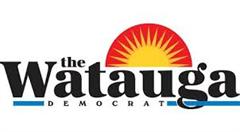News Home
Congress OKs student loan rate dealWatauga Democrat
Washington,
August 2, 2013
"We've all seen how Washington's involvement in rate-setting is a recipe for uncertainty and confusion. Students deserve better," Foxx said in a statement Wednesday. The Bipartisan Student Loan Certainty Act ... ends the temporary fixes that have failed to strengthen our nation's student loan system and offers long-term simplicity, rate caps and an assurance that interest rates are immediately in line with the free market."
by Anna Oakes A month after federal student loan rates doubled to 6.8 percent, Congress on Wednesday agreed to a bill that ties student loan interest rates to financial market conditions. The compromise legislation, H.R. 1911, sets subsidized undergraduate Stafford loans at the rate of a 10-year Treasury note plus 2.05 percent. Graduate Stafford loans will be set at the 10-year Treasury note rate plus 3.6 percent, while the formula for graduate and parent PLUS loans is the 10-year Treasury note plus 4.6 percent. As a result, undergraduate Stafford loan rates will now be reduced to approximately 3.9 percent but could increase as the economy continues to recover. However, the bill caps rates at 8.25 percent for undergraduate Stafford loans, 9.5 percent for graduate Stafford loans and 10.5 percent for PLUS loans. North Carolina representatives have been active in promoting their preferred solutions to student loan rate setting over the past few months. Republican U.S. House Rep. Virginia Foxx of North Carolina's Fifth District was one of the co-sponsors of H.R. 1911. Foxx is chairwoman of the House Education and the Workforce Committee's Subcommittee on Higher Education and Workforce Training. "We've all seen how Washington's involvement in rate-setting is a recipe for uncertainty and confusion. Students deserve better," Foxx said in a statement Wednesday. The Bipartisan Student Loan Certainty Act ... ends the temporary fixes that have failed to strengthen our nation's student loan system and offers long-term simplicity, rate caps and an assurance that interest rates are immediately in line with the free market." Sen. Richard Burr (R-NC) was a co-sponsor of a similar measure in the U.S. Senate. Sen. Kay Hagan (D-NC) voted in favor of the compromise bill on July 24 after voting against a similar House proposal in June, at that time stating she was opposed to allowing student loan rates to fluctuate -- "leaving students with uncertainty over rates that could skyrocket." Hagan in June introduced legislation that would have maintained the 3.4 percent student loan rate for two more years, but it failed to move forward. "This bipartisan compromise will allow students to take advantage of today's low interest rates and reduce their costs in the next few years," Hagan said July 24. "This plan also includes a cap of 8.25 percent, which was a key priority for me in getting a bipartisan solution to keep rates low." The bill now goes to President Barack Obama for his signature. |

